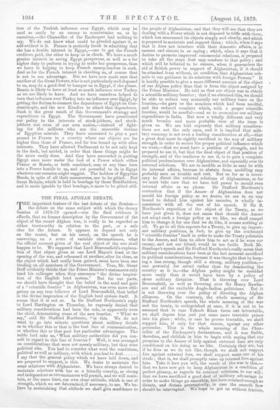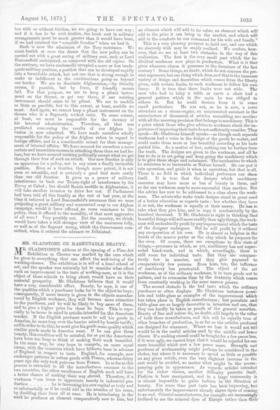THE FINAL AFGHAN DEBATE. T HE important feature of the last
debate of the Session— the debate on the same subject with which the dreary Session of 1878-79 opened—was the final evidence it affords, that no former description by the Government of the object of the recent Afghan war, is really to be regarded as either trustworthy in relation to the past, or a safe
clue for the future. It appears to depend not only on the orator, but on his mood, on the speech he is answering, on a score of variable circumstances, what the official account given of the real object of the war shall happen to be. We supposed that Lord Beaconsfield's explana- tion of that object given at one Lord Mayor's feast at the opening of the war, a,nd rehearsed at another, after its close, as the object which had really been gained, must have been one binding on all members of the Government. True, Mr. Grant Duff evidently thinks that the Prime Minister's statements only bind his colleages when they announce "the divine inspira- tion of the English land system." But for our parts, we should have thought that the belief in the need and gain of a "scientific frontier" in Afghanistan, was even more obli- gatory on any true follower of Lord Beaconsfield, than belief in the divine inspiration of tho English land system itself. It seems that it is not so. In Sir Stafford Northcote's reply to Lord Hartington on Thursday, he expressly denied that military considerations had been the sole, or apparently even the chief, determining cause of the new frontier. "What we say," said Sir Stafford Northcote, "is this. We do not want to go into minute questions about military details as to whether this or that is the best line of communication, or whether this or that post has particular advantages. The noble lord asks us, 'What military authorities did you con- sult in regard to this line of frontier?' Well, it was arranged on considerations that were not merely military, but that were political also. You bad to consider what were the conditions, political as well as military, with which you had to deal I say that the general policy which we have laid down, and are prepared to support, is this. We desire to maintain the same relations with Afghanistan. We have always desired to maintain relations with her as a friendly country, as strong and independent as circumstances will permit, and we will main- tain, at the same time, our own clear attitude, which is one of strength, which we are determined, if necessary, to use. We be- Uwe by maintaining that attitude we shall give confidence to the people of Afghanistan, and that they will see that they are dealing with a Power which is not disposed to trifle with them, which has announced its objects simply and clearly, and which is prepared to maintain and support them ; which, when it says that it does not interfere with their domestic affairs, is in earnest and sincere in so saying ; which, when it says that it desires to promote improved commercial relations, ia prepared to take all the steps that may conduce to that policy ; and which will be believed to be sincere, when it guarantees the aid of British power in support of Afghanistan, if it should be attacked from without, on condition that Afghanistan sub- mits to our guidance in its relations with foreign Powers." It is hardly possible to give a more different account of the object of our Afghan policy than that is from the object assigned by the Prime Minister. He told us that our object was to obtain a scientific military frontier ; that if we obtained this, we should be able to reduce very materially our military force on the frontier,—he gave us the numbers which had been needful, and the reduced numbers which, with a proper scientific frontier, would. be needful—and so to economise our military expenditure in India. But now a totally different and very much broader and more probable view of the issue is given us. We are told expressly that military considera- tions are not the only ones, and it is implied that mili- tary economy is not even a leading consideration at all,—that a great deal must be rightly sacrificed in the way of military strength in order to secure the proper political influence which we want,—that we must have a position of strength, and be prepared to use it, but that the final object of that position of strength, and of the readiness to use it, is to gain a complete political predominance over Afghanistan, and especially over its external relations. We are to meddle as little as may be with its internal affairs, because to abstain from meddling may probably save us trouble and cost. But so far as is neces- sary to direct the external relations of Afghanistan, so far we must take care that we have full power to mould even internal affairs as we please. Sir Stafford Northcote's contention that if the Ameer of Afghanistan does not mould his foreign policy as we desire, we are in no way bound to defend him against his enemies, is wholly in- consistent with all the rest of his speech. If Sir S. Northcote's exposition of the object of the Treaty, as we have just given it, does not mean that should the Ameer not adopt such a foreign policy as we like, we shall compel him to change it for one that we do like, it means nothing at all. To go to all this expense for a Treaty, to give up import- ant military positions, in fact, to give up the celebrated "scientific frontier" itself in order to make the Treaty palatable to the Ameer, and then to allow him to act as if he were our enemy, and not our friend, would be too futile. Both Mr. Stanhope's speech and Sir Stafford Northcote's really mean that military considerations have been at the last moment sacrificed to political considerations, because it was thought that by keep- ing a less strong, though still a strong, military position,— one powerful for attack rather than for dominating the country as it is,—the Afghan policy might be moulded more easily than it would have been by a policy of sheer military dictation. That is throwing over Lord Beaconsfield, as well as throwing over Sir Henry Rawlin- son and all the excitable Anglo-Indian politicians. But it is not throwing over the policy of directing the Afghan
alliances. On the contrary, the whole meaning of Sir Stafford Northcote's speech, the whole meaning of the war and the treaty, is extinguished at once, if it is not to be assumed that in case Yakoob Khan turns out intractable, WO shall depose him and put some more tractable prince into his place; while, in case he proves tractable, we shall support him, if only for that reason, against any other pretender. That is the whole meaning of the Chan- cellor of the Exchequer's declarations, and it was feeble, therefore, and childish in him to begin with saying that our promises to the Ameer of help against external foes are only conditional on his doing as we like. Certainly they are, but if he does as we do not like, though we shall not support him against external foes, we shall support some one of his rivals ; that is, we shall promptly raise up internal foes against him. Take it how you will, the result of the war is this,— that we have now got to keep Afghanistan in a condition of perfect pliancy, as regards its external relations, to our will ; that we have sacrificed a good deal of military advantage in order to make things go smoothly, but have retained enough la dictate, and dictate peremptorily, in case the smooth flow should be interrupted. We hope to get on without friction, but with or without friction, we are going to have our way ; and if it has to be with friction, the fresh cost in military arrangements must be much greater than it would have been, if we had retained the "scientific frontier" when we had it.
Such is now the admission of the Tory statesmen. We must banish at once the dream that the new policy can be carried out with a great saving of military cost, such as Lord Beaconsfield anticipated, as compared with the old regime. On the contrary, we have confessedly occupied a more or less inade- quate military position, a position that can be developed rapidly into a formidable attack, but not one that is strong enough to make us indifferent to the combinations going on beyond our border. We are to dominate Afghanistan,—by friendly means, if possible, but by force, if friendly means fair. For that purpose, we are to keep a pliant instru- ment on the throne, or get one there, if our existing instrument should cease to be pliant. We are to meddle as little as possible, but to this extent, at least, meddle we must. And again, we cannot keep a pliant instrument on the throne who is a flagrantly wicked ruler. To some extent, at least, we must be responsible for the decency of his internal administration. Therefore, all that was predicted concerning the results of our Afghan in- vasion is now admitted. We have made ourselves wholly responsible for the policy of the Afghan rulers in regard to foreign affairs, and to a considerable extent for their manage- ment of internal affairs. We have secured for ourselves a more certain and immediate success in attacking them than we had be- fore, but we have secured nothing politically except what we get through their fear of such an attack. Our new frontier is only an apparatus for a policy, not in any sense a finally invincible position. Even as a frontier, though more potent, it is not even so scientific, and is certainly a good deal more costly than our old frontier. It gives us a power of military interference to back our Treaty-right of interference by the Envoy at Cabul ; but should Russia meddle in Afghanistan, it will take another invasion to drive her out. If Parliament had been told all this frankly at the end of last year, at the time it believed in Lord Beaconsfield's assurance that we wore projecting a great military and economical eetip in our Afghan campaign, would it have offered no more resistance to the policy, than it offered to the morality, of that most aggressive of all wars ? Very possibly not. But the country, we think, would have taken a still stronger view of the enormous folly, as well as of the flagrant wrong, which the Government com- mitted, when it ordered the advance on Jellalabad.



































 Previous page
Previous page